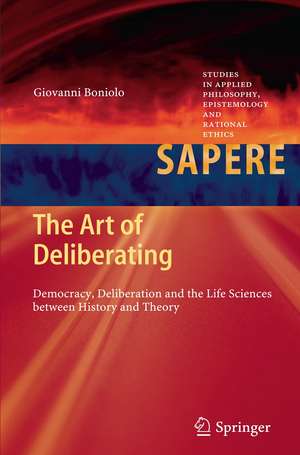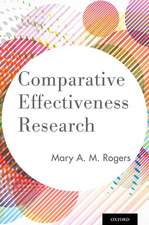The Art of Deliberating: Democracy, Deliberation and the Life Sciences between History and Theory: Studies in Applied Philosophy, Epistemology and Rational Ethics, cartea 6
Autor Giovanni Bonioloen Limba Engleză Paperback – 20 sep 2014
Giovanni Boniolo goes back to the historical and theoretical foundations of deliberation showing us, with some irony, that deliberation is a matter of competence, and not just a matter of a right to decide. His conclusion might not delight everyone: “anyonewho is not sufficiently acquainted with the subject matter or lacks the sufficient deliberative competence ought not be admitted to deliberative discussions. This restriction makes both good deliberation and a proper deliberative democracy possible, otherwise debate degenerates into demagogy and hypocrisy”.
| Toate formatele și edițiile | Preț | Express |
|---|---|---|
| Paperback (1) | 934.86 lei 6-8 săpt. | |
| Springer Berlin, Heidelberg – 20 sep 2014 | 934.86 lei 6-8 săpt. | |
| Hardback (1) | 946.24 lei 6-8 săpt. | |
| Springer Berlin, Heidelberg – 18 aug 2012 | 946.24 lei 6-8 săpt. |
Din seria Studies in Applied Philosophy, Epistemology and Rational Ethics
- 20%
 Preț: 603.89 lei
Preț: 603.89 lei -
 Preț: 397.59 lei
Preț: 397.59 lei -
 Preț: 359.53 lei
Preț: 359.53 lei - 20%
 Preț: 989.96 lei
Preț: 989.96 lei - 24%
 Preț: 787.48 lei
Preț: 787.48 lei -
 Preț: 390.08 lei
Preț: 390.08 lei -
 Preț: 370.88 lei
Preț: 370.88 lei - 15%
 Preț: 641.20 lei
Preț: 641.20 lei - 20%
 Preț: 991.60 lei
Preț: 991.60 lei - 20%
 Preț: 646.95 lei
Preț: 646.95 lei - 15%
 Preț: 653.98 lei
Preț: 653.98 lei -
 Preț: 384.48 lei
Preț: 384.48 lei -
 Preț: 395.47 lei
Preț: 395.47 lei - 18%
 Preț: 1216.95 lei
Preț: 1216.95 lei - 18%
 Preț: 947.50 lei
Preț: 947.50 lei -
 Preț: 388.72 lei
Preț: 388.72 lei -
 Preț: 390.08 lei
Preț: 390.08 lei -
 Preț: 395.09 lei
Preț: 395.09 lei -
 Preț: 394.12 lei
Preț: 394.12 lei - 15%
 Preț: 644.82 lei
Preț: 644.82 lei - 15%
 Preț: 698.15 lei
Preț: 698.15 lei - 18%
 Preț: 1840.91 lei
Preț: 1840.91 lei - 20%
 Preț: 656.84 lei
Preț: 656.84 lei -
 Preț: 389.70 lei
Preț: 389.70 lei - 20%
 Preț: 991.46 lei
Preț: 991.46 lei - 15%
 Preț: 585.73 lei
Preț: 585.73 lei - 15%
 Preț: 711.40 lei
Preț: 711.40 lei - 15%
 Preț: 589.33 lei
Preț: 589.33 lei - 15%
 Preț: 700.42 lei
Preț: 700.42 lei
Preț: 934.86 lei
Preț vechi: 1140.07 lei
-18% Nou
Puncte Express: 1402
Preț estimativ în valută:
178.88€ • 187.77$ • 148.48£
178.88€ • 187.77$ • 148.48£
Carte tipărită la comandă
Livrare economică 10-24 aprilie
Preluare comenzi: 021 569.72.76
Specificații
ISBN-13: 9783642426544
ISBN-10: 3642426549
Pagini: 204
Ilustrații: XVIII, 186 p.
Dimensiuni: 155 x 235 x 11 mm
Greutate: 0.3 kg
Ediția:2012
Editura: Springer Berlin, Heidelberg
Colecția Springer
Seria Studies in Applied Philosophy, Epistemology and Rational Ethics
Locul publicării:Berlin, Heidelberg, Germany
ISBN-10: 3642426549
Pagini: 204
Ilustrații: XVIII, 186 p.
Dimensiuni: 155 x 235 x 11 mm
Greutate: 0.3 kg
Ediția:2012
Editura: Springer Berlin, Heidelberg
Colecția Springer
Seria Studies in Applied Philosophy, Epistemology and Rational Ethics
Locul publicării:Berlin, Heidelberg, Germany
Public țintă
ResearchCuprins
Deliberation and democracy.- Plato was not so far wrong: recalling Athenian democracy.- A reappraisal of the Medieval approach will lead to excellent deliberators.- Beware of those who think they possess the truth!.- Let us learn how to deliberate before deliberating! Between ethics and biomedicine.
Textul de pe ultima copertă
How may citizens take part in moral and political decisions concerning the results obtained by the contemporary life sciences? Should they blindly follow skilled demagogues or false and deceptive leaders? Should they adhere to the voice of the majority, or should they take a different decisional path? Deliberative democracy answers these questions, but what is deliberative democracy? Can we really deliberate if we are completely ignorant of the relevant issue? What about ethical or political expertise, is it strictly necessary? Finally, and most significantly, can a deliberative process take place if we ignore the techniques governing it; that is, the techniques required to be minimally skilled in rational argumentation?
Giovanni Boniolo goes back to the historical and theoretical foundations of deliberation showing us, with some irony, that deliberation is a matter of competence, and not just a matter of a right to decide. His conclusion might not delight everyone: “anyone who is not sufficiently acquainted with the subject matter or lacks the sufficient deliberative competence ought not be admitted to deliberative discussions. This restriction makes both good deliberation and a proper deliberative democracy possible, otherwise debate degenerates into demagogy and hypocrisy”.
Giovanni Boniolo goes back to the historical and theoretical foundations of deliberation showing us, with some irony, that deliberation is a matter of competence, and not just a matter of a right to decide. His conclusion might not delight everyone: “anyone who is not sufficiently acquainted with the subject matter or lacks the sufficient deliberative competence ought not be admitted to deliberative discussions. This restriction makes both good deliberation and a proper deliberative democracy possible, otherwise debate degenerates into demagogy and hypocrisy”.
Caracteristici
Offers a comprehensive introduction to deliberative democracy Analyzes the role of common people in discussions on ethics from a historical and philosophical perspective Describes best-practice approaches to good deliberation














